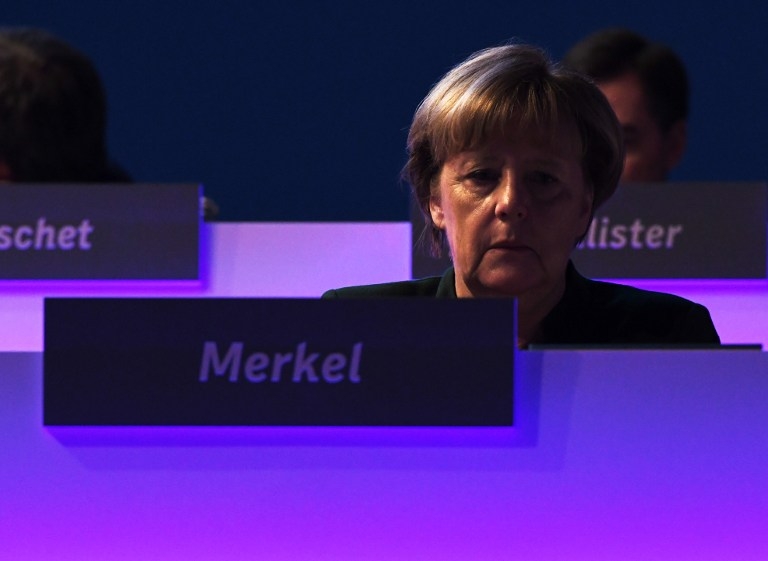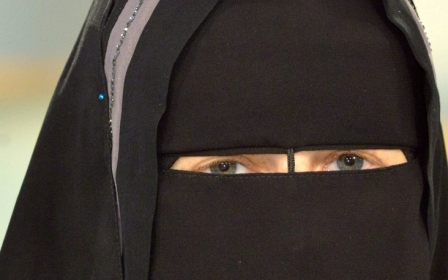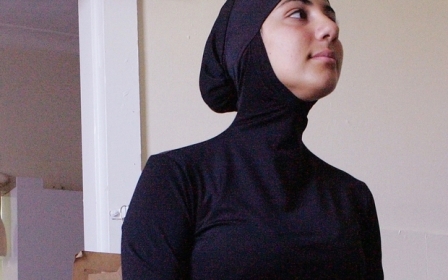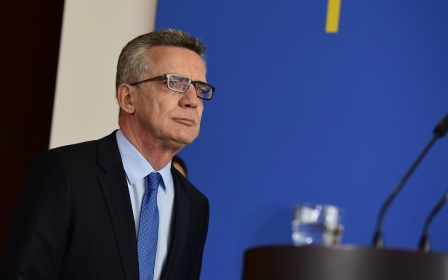Germany's full-face veil ban is a shift in the wrong direction

Following the election of Donald Trump, who capitalised on the frustrations and fears of many, and on deep-rooted racism and misogyny, The New York Times published an article entitled “As Obama Exits World Stage, Angela Merkel May Be the Liberal West’s Last Defender”.
Every individual has the right to express their beliefs or identity by choosing how they dress, and our governments have an obligation to respect and protect those rights
Indeed, Merkel has proven to be a strong liberal politician. However, she now seems unwilling to defend all forms of religious expression.
This week, she endorsed her political party’s call for a nationwide partial prohibition on full-face veils, signalling a shift in her otherwise tolerant stance on the freedoms of religion and expression – and one that is not in line with liberal Western values.
Merkel under pressure
As the results of the most recent regional elections, held in September, reveal, Merkel’s popularity has been severely dented.
The significant drop in support comes more than a year after her government launched an immigration policy that has so far welcomed to Germany one million asylum seekers and refugees from the Middle East and North Africa region.
Meanwhile, the right-wing party Alternative für Deutschland (AfD), led by Frauke Petry, has gained considerable electoral momentum.
This anti-immigrant party has obtained political capital following a series of violent incidents involving Muslim immigrants. Using slogans such as “Islam does not belong in Germany”, AfD has effectively attracted discontented voters.
It seems that, in response to this backlash, Merkel aims to regain her electorate’s support by adopting a tougher stand on both immigration and integration.
Her first stop: endorsement of the full-face veil ban.
Build-up to the ban
A partial ban, clearly intended to neutralise growing anxiety over the integration of Muslims in Germany, was proposed this summer by German interior minister Thomas de Maiziére.
At the time, Merkel said, “From my standpoint, a fully veiled woman scarcely has a chance at full integration in Germany.”
Yet, instead of pushing for regulating Muslim attire, Merkel and other government officials seemed to trust their citizen’s application of common sense. For example, full-face veiled women willingly uncovering their faces during airport security checks.
But on Tuesday, in her first party speech since she announced that she would run for a fourth term, Merkel argued that the full-face veil “should be banned, wherever it is legally possible”, pandering to the most conservative factions within her Christian Democratic Union (CDU) political party.This move has not yet translated into full support for her upcoming campaign. After her speech, only 89.5 percent of CDU delegates re-elected Merkel as their party leader – her lowest endorsement yet during her time as chancellor.
Liberal stance on asylum seekers and refugees
Under Merkel, Germany’s open borders approach to the so-called refugee crisis has contrasted starkly with the failure of other EU member states to fulfil their humanitarian obligation to admit asylum seekers and refugees from the Middle East and North Africa, often citing security concerns. However, Germany’s policy is now expected to stiffen.
In her speech on Tuesday, Merkel also told members of her party that a situation in which Germany loses control of its borders “cannot, may not, and should not be repeated”.
Fortunately, Merkel’s stance on the situation in the Middle East continues to be critical towards those who ignore it.
In her speech, she stated: “To be honest, if a free-trade agreement with the United States of America can bring hundreds of thousands out on to the streets, but the barbarous bombardments of Aleppo do not trigger any public protests, then something is wrong with our political standards.”
Europe on the full-face veil
Support for bans on full-face veils has grown across Europe since France became the first country to implement such a law in 2011, followed by other European countries, including Belgium.
Of course, many have questioned to what extent these types of laws violate human rights.
In principle, the European Convention on Human Rights bars government action designed to discriminate against a certain religion, or suppress expression of specific religious beliefs.
The full-face veil is precisely an expression of specific religious beliefs. Women who willingly wear full-face veils do so as an expression of their religious identity.
To the surprise of many, in 2014, the European Court of Human Rights (ECHR), upheld France’s law, accepting the argument that this ban encouraged French citizens to “live together”.
The ECHR ruled that the French ban on full-face veils did not violate the guarantees of “freedom of thought, conscience, and religion”, or the prohibition of discrimination on the basis of religion, national, or social origin.
The reality, however, was that I, as an agnostic Spaniard, had the right to choose my attire every morning, while Muslim women in France did not.
Our liberal Western values
Regulating the use of attire constitutes a violation of our human rights. This violation is only permissible under legitimate circumstances, such as a situation in which national security is at stake.
Banning the use of full-face veils in university settings, for example, as the German ban plans on regulating, is not justifiable.
Rather than “encouraging citizens to live together”, this regulation might encourage full-face veiled women to avoid university settings, where they will not be able to exercise their rights as the other students.
Every individual has the right to express their beliefs or identity by choosing how they dress, and our governments have an obligation to respect and protect those rights.
- Tania Ildefonso Ocampos is a Spanish political analyst who specialises in EU strategy in the Middle East. She is a former Schuman trainee (Euro-Med and Middle East Unit of the European Parliament's Directorate-General for External Policies), and holds an MA in Middle Eastern History from Tel Aviv University, Israel.
The views expressed in this article belong to the author and do not necessarily reflect the editorial policy of Middle East Eye.
Photo: German Chancellor Angela Merkel looks on during a Christian Democratic Union congress in Essen, Germany (AFP)
New MEE newsletter: Jerusalem Dispatch
Sign up to get the latest insights and analysis on Israel-Palestine, alongside Turkey Unpacked and other MEE newsletters
Middle East Eye delivers independent and unrivalled coverage and analysis of the Middle East, North Africa and beyond. To learn more about republishing this content and the associated fees, please fill out this form. More about MEE can be found here.





